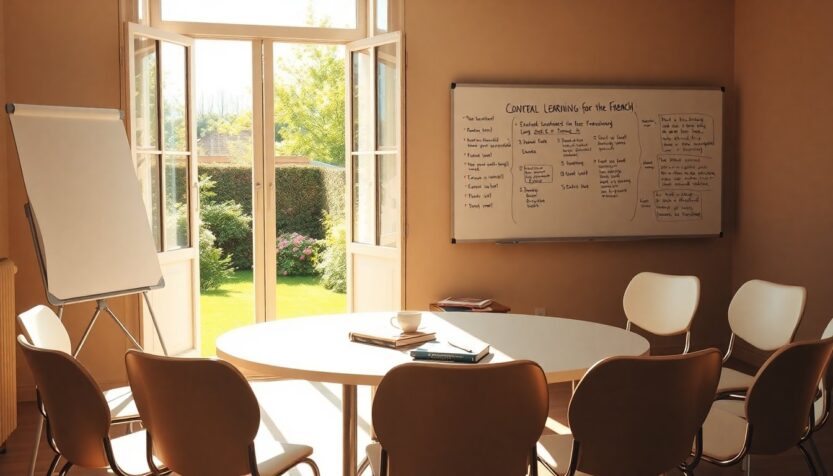It’s a well-known fact that many individuals dread public speaking more than the thought of death itself. This peculiar hierarchy of fear is a reminder of how illogical our anxieties can be. Fear often creeps into our lives uninvited, whispering doubts that restrain our growth. Regardless of our accomplishments or age, it can hold us back from realizing our full potential.
My fascination with fear intensified after viewing astronaut Chris Hadfield’s insightful TED Talk titled What I Learned from Going Blind in Space. He posed three thought-provoking questions that lingered in my mind long after the talk concluded. These questions made me reflect on the notion that avoidance is the true adversary, not the fear itself. Every time we dare to act in spite of our fears, we expand our self-concept.
The fear of language learning
You might wonder why I would connect the vastness of space with the journey of acquiring a new language. After over 10,000 hours devoted to teaching French, I’ve come to realize that each class serves as a courageous exploration. In these sessions, students don’t merely grasp grammar and vocabulary; they also learn to embrace visibility and the experience of being seen as they attempt to communicate.
Engaging with a new language invites a wave of uncertainty. It’s within this uncertainty that true confidence begins to blossom—not through motivational quotes or affirmations, but through genuine exposure, shared laughter, and the realization that our fears are often exaggerated.
Common myths about learning
Many learners experience a familiar sensation when they falter mid-sentence in a foreign tongue: a physical response to the dread of judgment. Throughout my teaching career, I’ve encountered numerous misconceptions about language learning.
Statements like “I’ll never be good at French” or “Others are naturally talented language learners” echo through the minds of many. These narratives are misleading and often stem from years of self-doubt. We may perceive confident speakers as a different breed—more courageous, youthful, or fortunate. In reality, they have simply progressed further along the same journey we all share.
Exceptional individuals with impressive careers often commence their French language journey with the same timidness as anyone else. Their trepidations do not revolve around the intricacies of language structure, but rather the vulnerability of being seen during their learning process. They fear that showcasing their progress equates to exposing their failures.
Building confidence through practice
Confidence is not a trait that arrives unannounced; it is a result of action. When we speak, we survive the experience, leading our nervous systems to update our self-narrative to “I can do this.” With this minor cognitive shift, a new version of ourselves begins to emerge.
It’s common to consider confidence as an innate quality—something we either possess or constantly seek. However, my experience suggests it operates more like a muscle: one that can be developed, nurtured, and at times, may feel sore, yet is always capable of growing stronger through use.
The three components of confidence
Confidence comprises three essential elements: permission to attempt, perspective on mistakes, and practice coupled with feedback. Each learner exists within this triangular framework. Some require validation before embarking on their journey, while others need to reassess their understanding of errors as valuable feedback rather than failures. Ultimately, all learners benefit from a cycle of practice and constructive critique.
In my classes, I’ve come to view the environment not merely as a space for language acquisition but as a nurturing ground for courage. Here, individuals are free to explore and grow braver.
Transformative stories
Consider David, a retired lawyer who often felt uncomfortable when speaking in French with his wife, who had more formal training. His breakthrough realization was that he was already on the path to fluency, giving him the confidence to engage. Then there’s Nikki, who returned to France as a judge in dressage competitions; her moment of clarity came when she recognized that striving for perfection was hindering her progress.
Nicky, who moved to France for retirement, found belonging through language learning. John, initially seeking an in-person class, discovered camaraderie in The French Room, and shared laughter while telling stories in French solidified his sense of belonging. Louise, whose twins were born in France, expressed that her studies transformed from rigid rules to empowering choices.
Finally, there’s Jane, who had dedicated 25 years to studying but faced panic when speaking. The day she spoke freely, her achievement felt monumental, akin to rolling a boulder down a hill—an exhilarating release.
These narratives illustrate that each student, while learning French, is also redefining their understanding of confidence.
At The French Room, the essence of learning transcends traditional lessons; it fosters a culture of bravery and connection. Confidence does not reside solely in the mind; it arises in the body when individuals risk embarrassment, discover their resilience, and choose to try again.
In summary, five key insights emerge from observing learners’ journeys: confidence cannot be thought into existence; we draw strength from one another; embracing predictability allows us to take risks; celebrating small victories builds credibility; and how we communicate in another language reflects our self-perception. These lessons extend beyond the classroom and serve as blueprints for personal growth.
Each time you step up to speak, even when feeling tentative, you engage in an act of defiance against fear. Every moment spent listening—both to oneself and others—expands our world. Perhaps confidence doesn’t emerge when fear dissipates, but rather it begins the moment we dare to speak, voice trembling and accent imperfect, and yet the world continues to listen.






